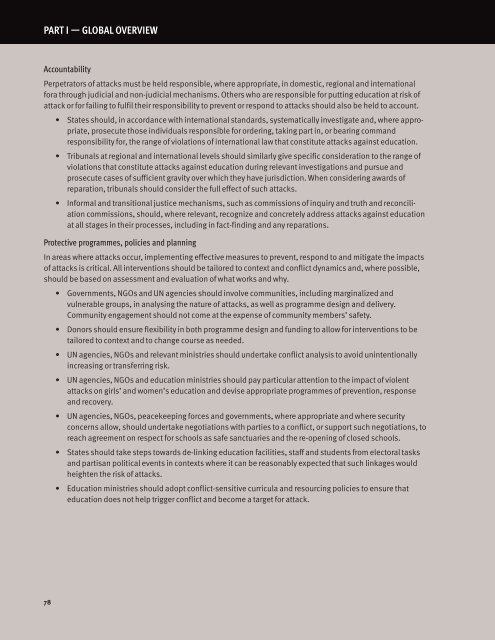You also want an ePaper? Increase the reach of your titles
YUMPU automatically turns print PDFs into web optimized ePapers that Google loves.
PART I — GLOBAL OveRvIeW<br />
Accountability<br />
Perpetrators of attacks must be held responsible, where appropriate, in domestic, regional and international<br />
fora through judicial and non-judicial mechanisms. Others who are responsible for putting education at risk of<br />
attack or for failing to fulfil their responsibility to prevent or respond to attacks should also be held to account.<br />
• States should, in accordance with international standards, systematically investigate and, where appropriate,<br />
prosecute those individuals responsible for ordering, taking part in, or bearing command<br />
responsibility for, the range of violations of international law that constitute attacks against education.<br />
• Tribunals at regional and international levels should similarly give specific consideration to the range of<br />
violations that constitute attacks against education during relevant investigations and pursue and<br />
prosecute cases of sufficient gravity over which they have jurisdiction. When considering awards of<br />
reparation, tribunals should consider the full effect of such attacks.<br />
• Informal and transitional justice mechanisms, such as commissions of inquiry and truth and reconciliation<br />
commissions, should, where relevant, recognize and concretely address attacks against education<br />
at all stages in their processes, including in fact-finding and any reparations.<br />
Protective programmes, policies and planning<br />
In areas where attacks occur, implementing effective measures to prevent, respond to and mitigate the impacts<br />
of attacks is critical. All interventions should be tailored to context and conflict dynamics and, where possible,<br />
should be based on assessment and evaluation of what works and why.<br />
• Governments, NGOs and UN agencies should involve communities, including marginalized and<br />
vulnerable groups, in analysing the nature of attacks, as well as programme design and delivery.<br />
Community engagement should not come at the expense of community members’ safety.<br />
• Donors should ensure flexibility in both programme design and funding to allow for interventions to be<br />
tailored to context and to change course as needed.<br />
• UN agencies, NGOs and relevant ministries should undertake conflict analysis to avoid unintentionally<br />
increasing or transferring risk.<br />
• UN agencies, NGOs and education ministries should pay particular attention to the impact of violent<br />
attacks on girls’ and women’s education and devise appropriate programmes of prevention, response<br />
and recovery.<br />
• UN agencies, NGOs, peacekeeping forces and governments, where appropriate and where security<br />
concerns allow, should undertake negotiations with parties to a conflict, or support such negotiations, to<br />
reach agreement on respect for schools as safe sanctuaries and the re-opening of closed schools.<br />
• States should take steps towards de-linking education facilities, staff and students from electoral tasks<br />
and partisan political events in contexts where it can be reasonably expected that such linkages would<br />
heighten the risk of attacks.<br />
• Education ministries should adopt conflict-sensitive curricula and resourcing policies to ensure that<br />
education does not help trigger conflict and become a target for attack.<br />
78


